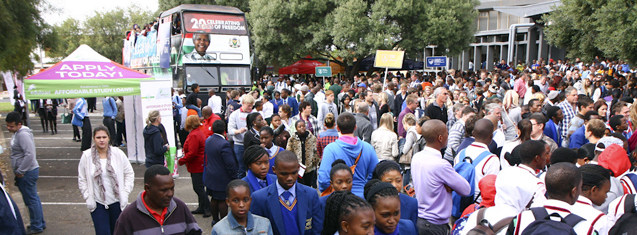Latest News Archive
Please select Category, Year, and then Month to display items
05 June 2018
Photo Supplied
 Archaeological excavations in the Wonderwerk Cave, north of Kuruman in the Northern Cape.
Archaeological excavations in the Wonderwerk Cave, north of Kuruman in the Northern Cape.
Research fellow Dr Lloyd Rossouw from the Department of Plant Sciences at the University of the Free State (UFS) recently published an article in the Nature Ecology and Evolution journal with Dr Michaela Ecker from the University of Toronto as lead author, and Dr James Brink, research fellow at the UFS Centre for Environmental Management. The findings described in “The palaeoecological context of the Oldowan-Acheulean in southern Africa” provides the first extensive paleoenvironmental sequence for the interior of southern Africa by applying a combination of methods for environmental reconstruction at Wonderwerk Cave, which have yielded multiple evidence of early human occupation dating back almost two million years ago.
Where water once was
The Wonderwerk Cave is found north of the Kuruman hills (situated in Northern Cape) a 140m long tube with a low ceiling. The surroundings are harsh. Semi-arid conditions allow for the survival of only hardy bushes, trees, and grasses. But during the Early Pleistocene, stepping out of the Wonderwerk Cave you would have been greeted by a completely different site, the researchers found. Using carbon and oxygen stable isotope analysis on the teeth of herbivores (Dr Ecker), fossil faunal abundance (Dr Brink), as well as the analysis of microscopic plant silica remains (phytoliths) excavated from fossil soils inside the cave (Dr Rossouw), the results show that ancient environments in the central interior of southern Africa were significantly wetter and housed a plant community unlike any other in the modern African savanna.
What difference does it make?
While East African research shows increasing aridity and the spread of summer-rainfall grasslands more than a million years ago, the results from this study indicate an interesting twist. During the same period, shifts in rainfall seasonality allowed for alternating summer and winter-rainfall grass occurrences coupled with prolonged wetlands, that remained major components of Early Pleistocene (more or less the period between one and two million years ago) environments in the central interior of southern Africa. That means our human ancestors were also living and evolving in environments other than the generally accepted open, arid grassland model.
Now prospective Kovsies also know the feeling
2014-05-12

The UFS was a hive of excitement and activity with the annual Kovsie Open Day on Saturday 10 May 2014.
From drumming up a storm during the welcoming ceremony to moving about the lively students and vibrant residence stalls, prospective students and parents can now also say that ‘only a Kovsie knows the feeling’. Visitors also had first-hand experience of how accessible our Vice-Chancellor and Rector, Prof Jonathan Jansen, really is. At the Talk to Me gazebo outside his office, Prof Jansen dished up food while having a chat with parents.
This gesture echoed what Prof Jansen said earlier the morning as he addressed visitors to our Bloemfontein Campus in the Callie Human Centre. “The difference between us as Kovsies and other universities is that we are interested in you as a human being,” he said.
He then went on to introduce some of Kovsies’ top achievers. Among others were Izelle Lategan (U/21 SA women’s hockey player of 2013), Wayde van Niekerk (SA and Varsity Athletics 400m champion) and Izelke Klindt (BSc Hons in Astro Physics and winner of the Dean’s Medal in the Faculty of Natural and Agricultural Sciences for 2014).
OFM presenter Success Lekabe, who acted as programme leader during the welcoming ceremony, praised the UFS as one of “the best university institutions from across South Africa.”
“Kovsies are changing their students’ lives to change the lives of others,” Lekabe said.
The 2014 Kovsie Open Day, with all its fun and laughter, reflected the truth of the UFS as an academic institution that inspires excellence and transforms lives to all its visitors.
Even if you missed the Kovsie Open Day, be sure to grab the chance to study at our university and ensure a lifetime of excellence and innovation.